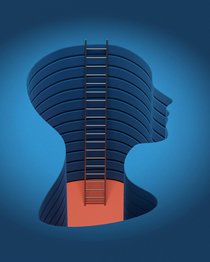Minds in society: Learning and cognition applied
One-day interdisciplinary seminar
Info about event
Time
Location
IMC meeting room 1483-312, Jens Chr. Skous Vej 4, 8000 Aarhus C
Organizer

A clear connection between current societal challenges and the cognitive and humanistic sciences is important and relevant for showing how individual projects can create value both inside and outside the university. In this seminar, we wish to discuss the ways in which research can benefit and move forward, and often address unique questions, as a result of its applied nature.
This one-day interdisciplinary seminar will focus on research that is conducted in public spaces or in society, and how research from the cognitive sciences and humanities can be applied in new ways. The seminar will present perspectives from different disciplines and approaches, with examples of research from e.g. museums, schools, and other institutions. The event will be relevant for anyone interested in a wide variety of methodologies for addressing research questions on human cognition or learning outside the walls of the university.
All are welcome - Registration is required (there are limited spaces): REGISTER HERE
Speakers
Ophelia Deroy: What curators and visitors can learn from attentional agency in museums
Professor of Philosophy and Neuroscience at the Ludwig Maximilian University in Munich, where she leads the Munich Interactive Intelligence Initiative (MI3) and the Cognition, Values and Behaviour (CVBE) Lab
Morten Nielsen: Event-based Research: A New Model for Cultural Historical World-Making?
Research Professor at the National Museum Denmark, and director of the Research Center for Social Urban Modelling (SUMO)
Christine Parsons: Everyday data: Using smartphones and location sensing technologies to track family dynamics
Professor in Translational Psychological Science, and director of the Interacting Minds Centre
Ella Paldam & Mette Bonnema: Co-creation of exhibitions with children and young people
Deputy Director and Head of Learning at The Science Museums, Aarhus University & MA student (History)
Marc Andersen: Science gone wild: Tales from the creepy outdoors
Associate professor, and co-director of the Recreational Fear Lab
Karsten Olsen: From models to minds: when science communication drives research
Researcher, Interacting Minds Centre and the Science Museums
Profs Chris and Uta Frith will also be participating
Programme
10.00 Coffee and welcome
10.15 Karsten Olsen
11.00 Ophelia Deroy
Lunch included
13.00 Marc Andersen
13.45 Ella Paldam
Coffee break
14.45 Christine Parsons
15.30 Morten Nielsen
16.15 General discussion
Short abstracts
Ophelia Deroy: What curators and visitors can learn from attentional agency in museums
Museums vary widely in content and form, but they share a common foundation: they present material objects designed to be looked at. At the very least, curators and museum professionals hope visitors will pay attention—and ideally, direct that attention toward particular aspects of what’s on display. Yet attention is precisely what many visitors struggle to sustain.
In this talk, I will present our work on attentional agency in museums—showing first how it reframes eye-tracking not just as a measurement tool, but as a way to actively engage visitors. Second, drawing both on empirical cases at the Museum Of Tomorrow, the Louvre and the Alte Pinakothek, and theoretical insights, I’ll explore how curators and visitors alike can better understand, guide, and share attention.
Morten Nielsen: Event-based Research: A New Model for Cultural Historical World-Making?
TBA
Christine Parsons: Everyday data: Using smartphones and location sensing technologies to track family dynamics
From "he said, she said" to GPS coordinates— this talk presents two studies examining family dynamics using experience sampling, smartphone geolocation recording and at-home sensing technologies. First, we asked new fathers and mothers to report on their own childcare behaviours and that of their partners, while also tracking their outdoor mobility patterns (123 couples). We found substantial discrepancies between what partners said they did, and what their partner perceived that they did. Analyses of mothers' mobility patterns showed that they spent more time at home than fathers. Second, we tested the viability of a hybrid indoor tracking system, incorporating Bluetooth- and ultrasound-based localisation of all family members, along with outdoor tracking. Collecting data from 17 households with 55 individuals for 1 week, we had strong participant compliance with intensive spatiotemporal tracking. Finally, I discuss why sensor-based approaches alone will not resolve debates about “who does what” at home, and discuss next steps in tracking families.
Ella Paldam: Co-creation of exhibitions with children and young people
TBA
Marc Andersen: Science gone wild: Tales from the creepy outdoors
What happens when fear science leaves the laboratory and enters fear-inducing public environments such as haunted attractions? At the Recreational Fear Lab, we investigate the psychological and physiological effects of recreational fear in naturalistic settings. This presentation highlights how field experiments conducted in collaboration with horror parks and cultural institutions have produced ecologically valid data on emotion and cognition, while simultaneously fostering public engagement, media interest, and mutual value for both researchers and partners. By situating research in real-world contexts, we have experienced unique participant motivation but also been able to contribute to dissemination more easily with broader appeal. Reflecting on the opportunities and challenges of this interdisciplinary fieldwork, the talk will explore how cognitive science can advance beyond the university, addressing novel questions through cross-sector collaboration.
